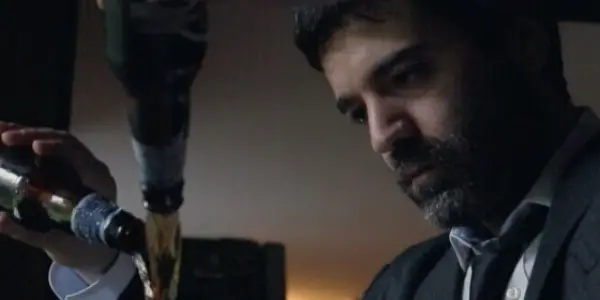JUST SAY GOODBYE: A Tale On Teen Suicide Is Saved By Stirring Perspective

Andrew Stover is a film critic/writer from the Chicagoland. His…
Matt Walting’s feature debut Just Say Goodbye manages to widen the conversation of teen suicide and mental illness by essentially uncloaking how most of us don’t know how to react when somebody we love, care for or even know, wants to commit suicide. Sure, when we hear such things, we rush to the scene to exude our solicitude and love, we supply them with suicide prevention lifelines, and we tell them how much their life is worth, yet, do we really relate? Can we really know their pain? Leaving the drippy or hackneyed “your life is precious” lines at home, do we really try to probe the pieces that helped fuel this permanent (and probably ill-advised) action, in a diligent manner? There are always signs, and we should be educated enough to acknowledge them.
Although improving greatly, the stigma of teen suicide is still vaguely misprized as some fugacious teenage phase or an attention-seeking teen, wanting to be embraced by society for their so-called “hardship”. Not only is this kind of stigma misguided, but it’s also acutely deleterious; it renders teens who are seriously impacted by mental illness as low priority, when, in reality, they should be receiving the attention they need from those who can emotionally help. But the confabulation of teen suicide almost reveals a mirror that reflects back an image of the victim that society will judge — whether or not that judgment is ill-considered or empathetic depends on the person and how they view mental illness. In a perfect world, everyone would treat mental health as a vital subject, but even with societal developments, specific topics like teen suicide are not rigorously dealt with — ultimately making Just Say Goodbye more important than it probably is in terms of quality.
Opening up to a brisk moment of a man with a cane, walking across a bridge, uttering words under his breath, the tension is vigorous and the situation is mysterious. During the transition to a younger Jesse (one of the leading characters), the camera follows Jesse as he enters the house in a puerile fashion, pouring a cold glass of milk, and transporting that fresh glass to his mom, Olivia (played by Olivia Nossiff), who first appears to be sleeping in the bedroom. Upon closer inspection, Jesse finds the empty medicine bottles near her bed and examines her motionless body, recognizing her demise and kissing his mother one last time before pulling the blanket over her lifeless body. The next scene then showcases the vexation and rancor of Jesse’s father (played by a fittingly acrid William Galatis as a conventional inebriate), who is recklessly burning all the pictures containing Olivia/Jesse’s mother.

Shifting 10 years later, vibrant teenager Sarah Morin (a relatively unknown yet capable Katerina Eichenberger) briefly alludes to her long-time friendship with Jesse (a quite understated performance from Max MacKenzie, who adequately emanates his pain through a flippant attitude), recapitulating Jesse’s parental hardships as a way to outline the severity of his mother’s death and how it brutally affected his father through alcoholism. Jesse’s father, Rick, has also endured an obscure injury, impacting him with a limp and a cane.
From that point on, the perspective is chiefly seen from Sarah’s. Despite being bullied and forced to weather the verbal abuse from his father, Jesse finds relish while in Sarah’s company. However, while packing for an upcoming trip to New York City with her father, a discontented Jesse informs Sarah of his plan to end his own life on his birthday. Driven to the edge by his alcoholic and verbally abusive father, the school bully Chase (Jesse Walters) and the penitence he feels for his mother’s death, Jesse’s future appears written, but a resolute and fretful Sarah tries to rewrite it.
Soul-stirring Perspective
Just Say Goodbye begins and ends hauntingly. The introduction of a younger Jesse, being the one to stumble across his mother’s exanimate body, sketches this harrowing picture of a child being left without a mother and a father whose wrath and ire essentially leaves Jesse, without a father as well. The 10-year shift was necessary but rather odd. Nothing against Katerina Eichenberger, she’s quite forceful and inspirational as the wonderfully implacable Sarah. In actuality, it’s the partial narration used to convey the direful aftermath of Jesse’s childhood and how Jesse and Sarah’s friendship blossomed, which neglects to exhibit more pieces of evidence: Sarah reminisces about their time in grade school, and she tries to reinforce the bond with Jesse by turning down the car for the sake of continuing their bike riding tradition to school, but there isn’t much dialogue that persuades viewers of their long-time friendship because they don’t verbally emulate teenagers in the modern-day. Sarah and Jesse’s friendship down the road is fractured by dialogue that lacks relatability and expanded chemistry/conversation, but there’s still hope in the chosen perspective of the film.
Just Say Goodbye works immensely well to display the dire ramifications Jesse will afflict upon those who care about him, by offering the outlook through his best friend. Sarah is trying to elicit optimism in Jesse’s dolorous life — scorning his planned suicide as a heedless and unmindful action, providing him with a suicide prevention lifeline and trying to prolong his life through trivial acts of garden ruination — but at this point, he may have his eyes set upon the barrel of the gun. Eichenberger sells the role well, proving her unbending and adamant attributes uphold a matchless personality; she’s a superlative human being who unveils why suicide prevention is insinuated before the act, and it’s up to those around the troubled individual to discern the inklings and allocate necessary platforms/techniques for aid.

Sometimes, the victim is smothered by agony, awakened by genetics or circumstances, but the end result is generally the same — and we can cure it by enhancing our knowledge and entirely diminishing the stigma. In a way, committing suicide can be perceived as a selfish act. But not every suicide victim is the same; we’re our own person with our own anguish. By incorporating Sarah as the prime character, Walting is able to implement a shred of intimacy and distinction between other mental health-oriented films. The victim may be struggling to breathe a minute longer, but once they’re gone and their pain has receded, the pain is only transmitted to those around them and who cared for them — and who continue to breathe and occupy the space that once belonged to the one who’s now gone. The point of view is what makes Just Say Goodbye more commendable and poignant, but Walting’s application is still flawed.
Faulty Execution
Layla O’Shea’s script is abundantly familiar, but then again, everything seen in Just Say Goodbye — from the parental drug and verbal abuse to the high school bullying — normally factor into a wounded state of mind. Sometimes, as we should (hopefully) all know, mental illness can also be influenced by genetics, and no physical or emotional facet can trigger the outcome because it’s already determined and is out of the person’s control.
Suicidal thoughts are kindled in various ways: it can include one’s dour setting/situation, churlish peers, undiagnosed depression (or any corresponding illness) or a hasty reaction done out of unhappiness. Suicide is grossly common, and despite manifesting a stance that deserves a podium, and a deft actress (Eichenberger) to speak her mind in a fervent manner, Walting is handling thorny subject matter that needs more time to attain its full effect.

Chase, being the ruthless and frivolous bully, is a hollow character, who even looks older for his age. His character blatantly implies to scars of hurt and jealousy, but the actor, Jesse Walters, isn’t able to pull off his character’s grasp for hegemony and romance. The portrayal of bullying is the most contrived aspect of the movie, and narrowly reveals another half-done subplot involving Jesse’s dad and Chase’s mom (which I can’t elucidate further on without spoiling). Jesse is a complicated teen, undergoing prolific distress, yet it remains unclear if he’s literally suffering from a precise mental illness, or if he simply had enough with life. Already not wholly examining Jesse’s concerns and difficulties of his life, the exploration into the death of Jesse’s mom is also neglected, squandering more potential.
Anchored by a gentle piano-driven score, the music replicates the intended aura of a scene, but the music is underused. The sound kind of cuts in-and-out, but minor imperfections are expected for an indie with a very tight budget. More underwhelmingly, the segments in which blistering melancholy is evoked, are rushed. And when the tension swiftly increases due to Jesse’s foolhardy actions, the scenes move fast and the characters’ reactions are undervalued. More screen time for the music, tension and the aftermath of everything, could have elevated the bold and evocative conclusion (which I will not disclose to you because I do believe the film still deserves viewership).
Just Say Goodbye: Imperfect but still Honest
Trying to encompass teen suicide, bullying, alcoholism, postpartum depression and the cruciality of friendship into one movie, Walting does what he can with a scant budget of $13,000 and a cast who is really hit-or-miss. Walting’s independent drama is a laudable strive to enlarge the implications and the all-inclusive consequences of suicide, and he does so with a passionate if still slightly stilted voice. Far from being perfect and far from being the solution to society’s approach to teen suicide, a freshly moving perspective revitalizes the discussion of what teen suicide entails for those close to the victim.
After all, Just Say Goodbye isn’t only conveying the agony of the sufferer, but it’s opening a dialogue regarding the heartache and repentance afflicted upon those who really cared for the suicide victim.
Do you believe mental health should be a priority in society? In your opinion, how have movies depicted mental health and teen suicide? More seriously, do you know what to do when somebody you know wants to commit suicide?
Note: If you know somebody who’s contemplating suicide, they can reach the National Suicide Prevention Lifeline by calling 1-800-273-8255.
Watch Just Say Goodbye
Does content like this matter to you?
Become a Member and support film journalism. Unlock access to all of Film Inquiry`s great articles. Join a community of like-minded readers who are passionate about cinema - get access to our private members Network, give back to independent filmmakers, and more.
Andrew Stover is a film critic/writer from the Chicagoland. His film & TV reviews can be found on Film Inquiry & Film Threat.













